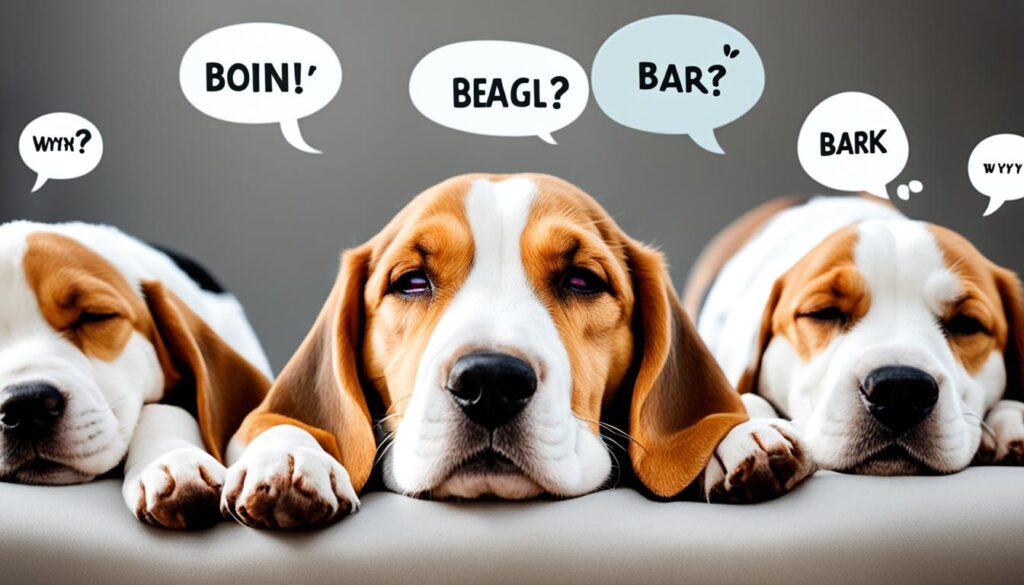Physical Address
304 North Cardinal St.
Dorchester Center, MA 02124

Have you been wondering why your Beagle puppy is not barking? It’s natural to be curious about the reasons behind your furry friend’s quiet demeanor. Beagles are known for their vocal nature, but sometimes they may choose alternative ways to express themselves.
Beagles have three ways they vocalize: barking, baying, and howling. While barking is the most common form of vocalization, some Beagles may not bark frequently or at all. This can be attributed to their roots as hunting dogs, where barking may not have been the most efficient way to communicate in the field.
It is important to understand that the lack of barking in your Beagle puppy may be completely natural. In fact, some Beagles may never bark, and this is perfectly normal for the breed. It could be influenced by their lineage, as Beagles from working bloodlines tend to be more vocal than those from show lines.
So, if your Beagle puppy is not barking, there’s likely no cause for concern. Let’s explore the different methods of vocalization that Beagles use and delve into the reasons why your puppy may be quiet.
Beagles have three methods of vocalization: howling, barking, and baying. Each method serves a different purpose and can vary in intensity and duration.
Howling: Howling is a distinct sound that Beagles use to communicate. It is often longer and more melodious than barking. Beagle puppies may start howling at around eight weeks of age, and it is a natural behavior for the breed.
Barking: Barking is usually done at specific times, such as mealtime or when a Beagle wants attention. It may indicate hunger or a desire for interaction. While some Beagles are known for their playful and vocal barks, others may be quieter or not bark at all.
Baying: Baying is a unique sound that Beagles make when they catch a scent or sense a possible threat. It is a deep, prolonged bark-like noise and is often associated with their hunting ancestry. This vocalization is less common in everyday situations.
It’s important to note that each Beagle may have different preferences when it comes to vocalization. Some may be more inclined to howl, while others may bark or bay more frequently. Understand and appreciate your Beagle’s individual personality and communication style.

Beagle vocalization is influenced by their ancestry as hunting dogs. Beagles were bred to howl to alert hunters to prey and to bay during the hunt. Some Beagles may not bark due to their genetics, and this is perfectly normal. It is important to understand that not all Beagles will bark, and it is not a cause for concern. Trying to make a Beagle puppy bark may not be necessary, as their natural vocalizations are already a part of their genetic makeup.
Beagles have a rich vocal repertoire that goes beyond barking. Their hunting heritage has shaped their vocalizations, which include howling and baying in addition to barking. Howling is a distinctive sound used to communicate, while baying is a response to scents or potential threats. While some Beagles are more vocal than others, it’s important to embrace their unique ways of expressing themselves.
“Beagles have a deep-rooted instinct to vocalize, whether it’s through barking, howling, or baying. Their genetic makeup determines their preference, and not all Beagles will bark frequently.”
If your beagle puppy isn’t barking, don’t worry! There are several reasons why some puppies may not bark as much:
Remember, it’s essential to embrace and accept your beagle puppy’s individuality, including their vocalization preferences. Instead of focusing on making them bark, provide a supportive and enriching environment that allows them to express themselves naturally.
There are several reasons why a Beagle puppy may not bark. One possible reason is their individual personality and temperament. Some Beagles are naturally quieter and may not feel the need to bark frequently. Another reason could be the level of stimulation and activity the puppy receives. A happy and active Beagle may have little desire to make noise for the sake of being heard. Additionally, if the dog is receiving plenty of attention and companionship, they may not feel the need to bark to get their owner’s attention.
Beagle puppies have unique personalities that can influence their vocalization patterns. Just like humans, dogs have their own preferences and behaviors. While some Beagles may be more inclined to bark, others may choose alternative methods of expression or remain quiet altogether. It’s important to remember that being quiet doesn’t necessarily indicate a problem, as long as the puppy is otherwise healthy and happy.
It’s worth noting that Beagles have a rich ancestry as hunting dogs, bred to use their vocalizations in specific ways. However, not all Beagles are equally vocal, and this trait can vary from dog to dog. If your Beagle puppy is not barking, it could simply be a result of their genetic makeup and instincts.
“Some Beagles are naturally quieter and may not feel the need to bark frequently.”
Remember that every dog is an individual, and what matters most is their overall well-being and behavior. As long as your Beagle puppy is healthy, active, and content, not barking excessively should not be a cause for concern. However, if you’re worried about your puppy’s vocalization or have any other questions, it’s always a good idea to consult with a veterinarian for personalized advice.
Providing a stimulating and enriching environment for your Beagle puppy can help keep them happy and engaged. Regular physical exercise, mental stimulation, and socialization are crucial for their overall development and well-being. Additionally, creating a routine that includes playtime, training sessions, and quality time together can help strengthen the bond between you and your four-legged companion.

If your Beagle puppy is not barking, there are a few things you can do to ensure their well-being.
Remember, every Beagle is unique, and some may simply be quieter than others. It’s essential to provide a loving and stimulating environment for your Beagle, regardless of their vocalization habits.
“It’s important to understand that not all Beagles will bark, and it is not a cause for concern.”
Consulting professionals can help address any specific concerns about your Beagle’s behavior and provide tailored advice based on their expertise.
If you’re unsure where to start, here are a few practical tips to help you ensure your silent Beagle is healthy and happy:
Remember, the goal is to create a balanced and enriching lifestyle for your Beagle, regardless of their vocalization habits.
| Tips for Dealing with a Silent Beagle | Benefits |
|---|---|
| Providing mental and physical stimulation | Preventing boredom and promoting overall well-being |
| Establishing a routine | Creating consistency and stability for your Beagle |
| Consulting professionals | Getting expert advice tailored to your Beagle’s specific needs |
By implementing these strategies and seeking guidance from professionals, you can ensure that your silent Beagle remains happy, healthy, and well-adjusted.
In conclusion, it is perfectly normal for some Beagle puppies to not bark frequently or be silent. This behavior can be attributed to their breed’s hunting ancestry and individual temperament. While barking is a common way for dogs to communicate, Beagle puppies may express themselves through other vocalizations like howling or baying.
It’s essential to provide a stimulating and enriching environment for your Beagle to prevent boredom and nurture their natural instincts. Engage them in activities that keep them mentally and physically active. Establishing a routine that includes regular exercise, training, and socialization is also crucial for their overall well-being.
If you have any concerns about your Beagle’s vocalization or general health, it’s always best to consult with a veterinarian for professional advice. They can provide guidance tailored to your specific situation and address any potential underlying issues.
Remember to love and embrace your Beagle for their unique characteristics and personality. Whether they are vocal or silent, your bond with them will be strengthened by understanding and appreciating their individuality.